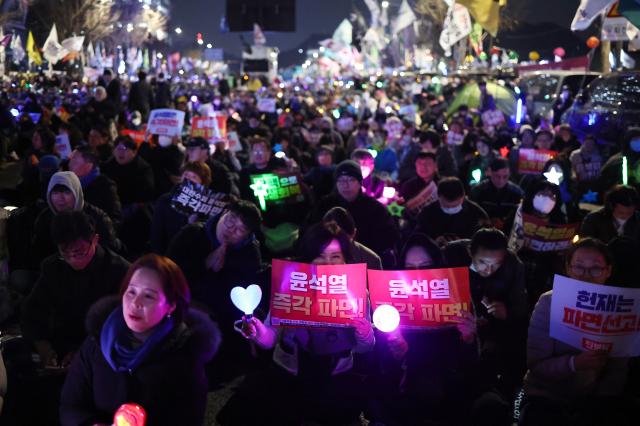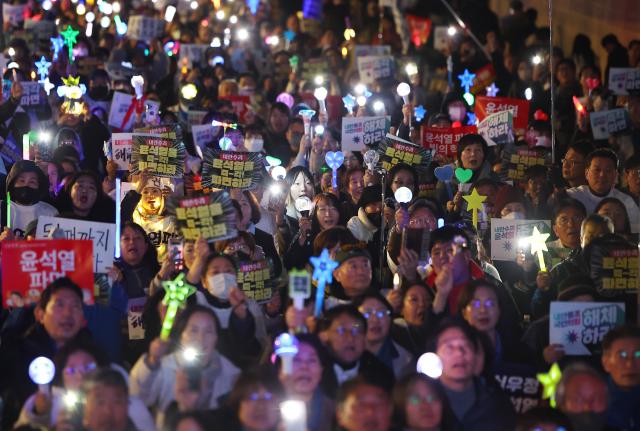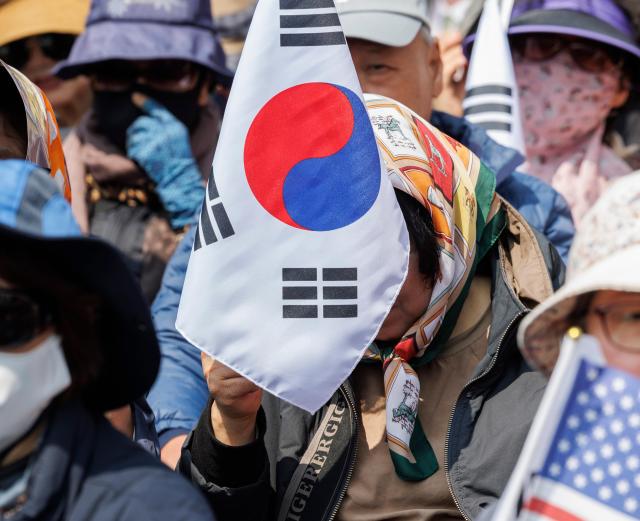이미지 확대

SEOUL, April 4 (AJP) - South Korea is now headed for an early presidential election, after the Constitutional Court on Friday upheld the National Assembly’s impeachment of President Yoon Suk Yeol.
The court's decision immediately strips Yoon of his presidential powers, triggering a nationwide vote that must be held within 60 days under the Constitution. The landmark ruling comes four months after Yoon declared emergency martial law on Dec. 3, a move that shocked the country and ultimately led to his impeachment.
Attention has now shifted to the next presidential race, and early polling suggests a clear frontrunner. A survey released by Flower Research on March 31 showed Lee Jae-myung, the leader of the opposition Democratic Party, far ahead of other contenders.
According to the poll, Lee received 46.3 percent support, while his closest conservative rival, Labor Minister Kim Moon-soo, polled at 9.7 percent. Seoul Mayor Oh Se-hoon and former Justice Minister Han Dong-hoon followed with 4.9 and 4.7 percent, respectively.
Lee led across all regions, including the traditionally conservative Daegu and North Gyeongsang Province, and in every age group except those aged 70 and older, where the race was extremely close. He also dominated among moderates and progressives, while conservative voters were more divided among Kim, Oh, and Han.
이미지 확대

His time as mayor of Seongnam from 2010 to 2018 laid the foundation for his national presence. Lee spearheaded urban renewal projects, including the Daejang-dong and Baekhyeon-dong developments, which later became the subject of intense political scrutiny. As mayor, he implemented policies aimed at welfare expansion, youth support, and civic participation, which helped build his image as a reform-minded and action-oriented leader.
Lee became the Democratic Party's presidential nominee in the 2022 election but narrowly lost to Yoon. Since then, he has remained the central figure in the opposition, despite being entangled in multiple legal investigations. Recently, Lee cleared a major legal hurdle when an appeals court acquitted him of violating the election law over remarks made during the 2021 presidential primary. The court ruled that his comments about not knowing a key city official were not false or misleading under the law.
Lee's continued political momentum is also remarkable considering he survived a life-threatening stabbing attack during a public event in Busan in January 2024. The assailant, later revealed to be politically motivated, was arrested at the scene. The incident drew nationwide sympathy and may have further strengthened Lee's image as a resilient leader.
In recent months, Lee has sought to broaden his appeal beyond the Democratic Party base, delivering speeches focused on economic reform, income inequality, and regional balance. He has also called for national unity in the wake of political upheaval, positioning himself as a stabilizing figure for a country facing institutional strain.
이미지 확대

In recent years, however, Kim has taken a sharp turn to the right, aligning himself with far-right evangelical Christian groups and drawing support from figures such as Pastor Jeon Kwang-hoon. This shift has made him popular within religious conservative circles, especially among older Christian voters, though it has also limited his broader national appeal.
Kim has focused his messaging on traditional family values, anti-communism, and religious freedom. His rhetoric has been sharply critical of the Democratic Party and progressive policies, often echoing talking points popular in ultra-conservative quasi-media.
Despite his low approval rating in national polls, Kim's growing base of devoted followers has allowed him to stand out in a fragmented conservative field. His challenge remains expanding beyond that core base to appeal to undecided and centrist voters.
이미지 확대

Oh's political career has seen both setbacks and revivals. After resigning in 2011 following a failed referendum, he made a comeback in the 2021 mayoral by-election and was re-elected in 2022. His return solidified his image as a seasoned and pragmatic administrator capable of regaining public trust.
Though his support in the Flower Research poll remains modest, Oh is viewed as a potential consensus candidate should conservative forces seek to unite behind a less polarizing figure. His calm demeanor and emphasis on practical governance resonate with middle-class and centrist voters, particularly in Seoul and surrounding areas.
Oh has so far avoided confrontational politics, focusing instead on housing reforms, digital infrastructure, and urban mobility. His platform may appeal to voters fatigued by ideological clashes and seeking stability.
이미지 확대

As justice minister, Han pursued high-profile cases targeting political and corporate figures, which drew both applause and criticism. After stepping down in 2024, he briefly served as acting leader of the People Power Party, signaling his broader political ambitions.
Han's base includes conservative-leaning youth and professionals drawn to his image as a clean, reform-oriented outsider. However, his lack of elected office experience and close ties to Yoon's administration may be a liability in the post-impeachment political climate.
To gain traction in a divided field, Han would need to distinguish himself from other conservative contenders while addressing concerns about his political independence. His legal credentials and communication skills remain assets as he seeks a path forward.
Copyright ⓒ Aju Press All rights reserved.





View more comments